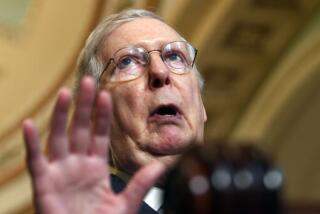Medicare Well Could Run Dry by ‘98, Trustees Say : Benefits: Changes in the health care system are vital to keep the hospital fund afloat, Shalala says. Social Security programs also face shortfall.
- Share via
WASHINGTON — The Medicare trust fund, which now pays the hospital bills of 34 million elderly Americans, will run out of money in five to seven years unless fundamental reforms are enacted to control soaring health care costs, federal officials said Tuesday.
The fund could be exhausted as early as 1998 if the economy performs poorly but would last only until 2000 even if there is more robust growth, trustees of Medicare’s Hospital Insurance Trust Fund said in their annual report, which also included an assessment of the Social Security retirement and disability funds.
Calling the Medicare hospital fund “severely out of financial balance,” the trustees said that only prompt, decisive remedies will correct the problem.
Secretary of Health and Human Services Donna Shalala, a trustee, said that the estimates “reflect many of the problems that we see across the board in our health care system today, and they are another demonstration of the need for system-wide change.”
Although Congress is not expected to allow the Medicare program to go broke, the report made it clear that lawmakers have relatively little time left to make sure the fund is solvent into the next century.
“This is an alert to Medicare beneficiaries and their relatives that we’ve got to start on total reform of the health care system,” said Robert Ball, former Social Security director.
In addition to the short-term problems the fund faces, its longer-term solvency also is in doubt, the report said.
The report said that payments from the hospital trust fund now represent 1.4% of the gross domestic product but will rocket to 5.1% by the year 2065. At the same time, the trustees warned, the gap between the number of workers paying the hospital insurance tax and the number of Medicare recipients will widen rapidly.
Now payroll taxes of about four workers are required to support each person over 65 who is eligible for Medicare, the report said, but by the year 2050, only two workers will be contributing for each recipient.
“Not only are the anticipated reserves and financing of the HI (hospital insurance) program inadequate to offset this demographic change, but under all the assumptions, the HI trust fund is projected to become exhausted even before the major demographic shift begins to occur,” the trustees said.
Although Medicare’s supplementary program, which pays doctor bills, is actuarially sound, the trustees said, its costs have surged 22% faster than the growth of the economy in the past five years and is also in need of comprehensive reform.
The annual reckoning was even more gloomy for the Social Security disability insurance trust fund, which the trustees also oversee. It is expected to run out of money, perhaps as soon as in two years, unless corrective action is taken. But its short-term problem can be solved more easily by shifting some of the Social Security payroll taxes from the retirement fund to pay disability benefits, the trustees said. They recommended congressional action to improve the financial stability of the fund.
As for the Social Security retirement fund, the report said that it would have income of $356 billion this year against outlays of $309 billion, or a surplus of $45 billion.
Income for this fund is projected to remain well above outlays until 2010, when costs will go up sharply as the baby boom generation starts to reach retirement age. The fund is expected to be exhausted in the year 2044, or 51 years from now.
The trustees recommended continued studies to find ways to manage anticipated deficits in the retirement fund for the second half of the next century.
All the funds are financed by a payroll tax on earnings. In 1993, the Social Security tax of 7.2% is being levied on wages up to $57,600; an additional 1.45% is assessed against pay up to $135,000 a year for hospital insurance. An estimated 42 million Americans receive some form of Social Security benefit.
In addition to Shalala, the trustees of the funds are Treasury Secretary Lloyd Bentsen, Labor Secretary Robert B. Reich and two public representatives, David M. Walker and Stanford G. Ross.
More to Read
Sign up for Essential California
The most important California stories and recommendations in your inbox every morning.
You may occasionally receive promotional content from the Los Angeles Times.












